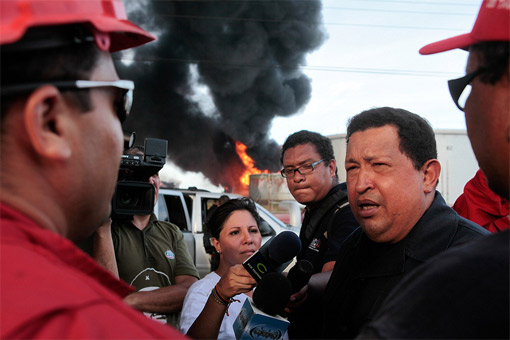After Hugo Chávez convincingly won re-election on Sunday, the margin of victory—over 1.5 million votes, totaling over 10 percentage points—has stunned members of Venezuela’s opposition, leaving them searching for answers.
Some pointed to the Consejo Nacional Electoral (National Electoral Council—CNE), which is controlled by chavistas and turned a blind eye to government abuses. Others pointed to the intimidation of public workers and beneficiaries of social programs. Yet another group simply interpreted the loss as a sign that the majority of Venezuelans who support Chávez simply have a different set of values.
They are all mistaken. The story of Chávez’ victory is simpler: it is a love affair between a people and their leader—one who, in their eyes, makes their lives better thanks to his generous use of the nation’s petro-dollars.
It was always going to be nearly impossible to beat a president with the deepest pockets in the world, one who is revered by a majority of his countrymen with the fervor of a religious leader. Most in the opposition were riding on high hopes about the possibility that this could be overcome with a near-perfect campaign from Henrique Capriles Radonski.
The opposition was wrong.
In the last few years, social spending under Chávez has increased dramatically. Stories abound of people in lower- and middle-income neighborhoods seeing their lives improve thanks to these policies—from electrical appliances at deeply-discounted prices to computers for poor children to free apartments.
However, that alone does not explain the result.
People also feel empowered because they feel they have access to greater education, even if there is no proof that chavista social programs actually improve productivity. The labor market certainly does not reward graduates of chavista educational “missions,” and many of them have no choice but to find employment in the government.
Further, there is a deep misunderstanding between the two camps in regard to the political preferences of public employees. Many in the opposition believe that public employees are all forced to attend Chávez’ rallies against their will. However, reports from people covering Chávez’ rallies spoke of a festive atmosphere; many feel genuine affection for their boss.
In sum, Chávez’ victory boils down to a love affair with a generous petro-crat. All the other factors may have played a role, but they don’t explain the outcome.
Issues on the Table
During his campaign, Hugo Chávez promised he would “be a better President.” He understands the problems Venezuelans face are numerous: an unbearable crime rate; a sputtering state-owned electric grid; crumbling infrastructure; stalled oil production; and a severely distorted economy that only produces oil efficiently.
On the issue of crime, perspectives for improvement are dim. In spite of a heavy military presence on the streets and a law banning the sale of alcohol and the carrying of firearms, election weekend saw 59 murders in the capital alone. The night that Chávez won, Luis Marcano, 26, was shot on his way home from celebrating the president’s victory at Miraflores Palace. His body was dumped in the street while still adorned with a Chávez t-shirt, according to press reports.
The government simply does not have the know-how or the political will to stop violent crime. Cracking down on crime would invariably require greater police coverage, intelligence in low-income neighborhoods, investment in prisons, a modernization of the prosecutor’s office and the justice system, and disarming the population. The Chávez administration is unlikely to put any serious effort toward addressing these issues.
Tackling the electricity crisis and Venezuela’s crumbling infrastructure would require massive public investment. But with oil prices stalled and with the fiscal deficit running at 15 percent of GDP, there is little elbow room. The alternative would be to open up the electricity sector to foreign companies, but this would take years to materialize.
The issue of stalled oil production is one of the few instances of consensus in Venezuela, as both the government and the opposition recognize the need to increase it. Now that the election is over, perhaps state-owned oil giant Petróleos de Venezuela S.A. (PDVSA) will be allowed to focus on its core business instead of managing social programs.
PDVSA’s business model in the Orinoco heavy-oil belt is one of joint ventures, with associations between PDVSA (as the majority owner) and companies such as Russia’s TNK-BP, France’s Total, Norway’s Statoil, and Chevron. To expand production, PDVSA is asking for financing from its Italian and Chinese partners.
Politically, the focus in the coming months will be on deepening Chávez’ socialist experiment. What that entails exactly, nobody knows. The banking sector, all remaining opposition media outlets and large manufacturing companies such as Empresas Polar are surely in the government’s crosshairs.
As with much of what Hugo Chávez does, the course of events will depend on what happens to the price of oil. Venezuela will face a complicated financial situation in 2013, but whenever Chávez has seemed like he was on the ropes, the price of oil rebounded and his problems appeared to be solved.
The Opposition Reflects
For the opposition, this latest loss is a bitter pill to swallow. After an inspiring campaign that coalesced all major opposition parties around Capriles, was executed almost flawlessly and focused on the right themes, the challenger lost by 10 percentage points—a margin wider than expected for the opposition, but nevertheless Chávez’ narrowest victory since his first election in 1998.
After achieving near-total unity and a primary that saw a massive turnout, the opposition is forced to go back to the drawing board and focus on gubernatorial elections in December and mayoral elections next April.
More importantly, they are forced to come to the realization that a majority of Venezuelans simply love their petro-president, and he is all too happy to love them back.
And in this love affair, there is no space for a third wheel.








